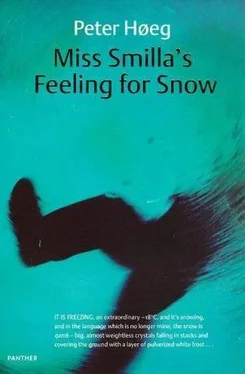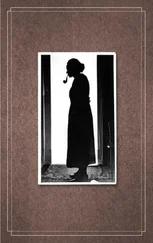Peter Høeg - Smilla's Sense of Snow aka Miss Smilla's Feeling for Snow
Здесь есть возможность читать онлайн «Peter Høeg - Smilla's Sense of Snow aka Miss Smilla's Feeling for Snow» весь текст электронной книги совершенно бесплатно (целиком полную версию без сокращений). В некоторых случаях можно слушать аудио, скачать через торрент в формате fb2 и присутствует краткое содержание. Жанр: Современная проза, на английском языке. Описание произведения, (предисловие) а так же отзывы посетителей доступны на портале библиотеки ЛибКат.
- Название:Smilla's Sense of Snow aka Miss Smilla's Feeling for Snow
- Автор:
- Жанр:
- Год:неизвестен
- ISBN:нет данных
- Рейтинг книги:3 / 5. Голосов: 1
-
Избранное:Добавить в избранное
- Отзывы:
-
Ваша оценка:
- 60
- 1
- 2
- 3
- 4
- 5
Smilla's Sense of Snow aka Miss Smilla's Feeling for Snow: краткое содержание, описание и аннотация
Предлагаем к чтению аннотацию, описание, краткое содержание или предисловие (зависит от того, что написал сам автор книги «Smilla's Sense of Snow aka Miss Smilla's Feeling for Snow»). Если вы не нашли необходимую информацию о книге — напишите в комментариях, мы постараемся отыскать её.
Smilla's Sense of Snow aka Miss Smilla's Feeling for Snow — читать онлайн бесплатно полную книгу (весь текст) целиком
Ниже представлен текст книги, разбитый по страницам. Система сохранения места последней прочитанной страницы, позволяет с удобством читать онлайн бесплатно книгу «Smilla's Sense of Snow aka Miss Smilla's Feeling for Snow», без необходимости каждый раз заново искать на чём Вы остановились. Поставьте закладку, и сможете в любой момент перейти на страницу, на которой закончили чтение.
Интервал:
Закладка:
Later, when I've gone back, I've tried to learn it again. As with so many other things, I haven't exactly succeeded, or failed either. That's about where I stand with my mother tongue-as if I were sixteen or seventeen years old.
And besides, there isn't one language in Greenland. There are three. The man on Isaiah's tape is speaking East Greenlandic. A southern dialect. It's incomprehensible to me.
From his tone of voice, I imagine that he's talking to someone else. But no one interrupts him. It sounds as if he's talking in a kitchen or a dining room, because every once in a while there's noise like silverware. Every once in a while there's the sound of an engine. Maybe it's a generator. Or electronic noise from the cassette recorder.
He's explaining something that's important to him. The explanation is lengthy, urgent, complicated, but there are also long pauses. In the pauses I can hear that behind his speech there is a hiss of something like music, maybe the sound of a wind instrument. The remnants of a previous recording that has not been adequately erased.
I give up trying to understand what he's saying and let my thoughts wander. The speaker can't be Isaiah's father; the dialect isn't right.
The voice finishes a sentence and stops. The pause button must have been pushed, because there's no crackling. One minute the voice is there, the next it's white noise. And far in the background, the remains of some distant music.
I let it hiss and put my feet up on the table.
Every so often I would play music for Isaiah. I would move the speakers over to the sofa, close to his damaged ears, and turn up the volume. He would lean back against the sofa and close his eyes. Often he would fall asleep.
Very quietly he would slump over on one side without waking up. Then I would gather him up and carry him downstairs. If it was too noisy down there, I would carry him back up and put him to bed. The instant I put him down, he would always wake up. And in that half-asleep state, hoarsely humming, he seemed to be trying to sing some bars of what he had heard.
I've closed my eyes. It's night. The last Christmas guests have taken their trailers full of presents home. Now they're lying in bed looking forward to the day after tomorrow, when they can go out and exchange them or get cash instead.
It's time for peppermint tea. Time to look out over the city. I turn toward the window. There's always the hope that it may have started to snow while my back was turned.
At that moment someone laughs.
I'm on my feet with my hands out in front of me. It's not a delicate, little-girl laugh. It's the phantom of the opera. I'll sell my life as dearly as possible.
There are four light taps and then the music starts. It's jazz. In the foreground there's the sound of a trumpet. It's coming from Isaiah's tape.
I push the stop button. It takes me a long time to come back down to earth. To build up a solid panic takes a fraction of a second. Getting rid of it can take half an evening.
I rewind and play the last part of the tape again. Again, the pause button is used. There's no warning, suddenly the laughter is there. Deep, triumphant, sonorous. Then the taps. Then the music. It's jazz and yet not jazz. There's something euphoric, disconnected about it. Like four instruments that have run amok. But it fools you. Because there is also a strange precision to it. Like a clown act in a circus ring. What takes the greatest precision is that it's supposed to sound like total chaos.
The tune plays for maybe seven minutes. Then the tape runs out, and the notes are abruptly cut off.
The music had a sense of energy. It gave me a strange lift, on top of the anxiety, at three o'clock on Christmas morning.
I sang in the church choir in Qaanaaq. I pictured the Three Wise Men wearing snowshoes, on dogsleds across the ice. With their gaze fixed on the star. I knew how they felt inside. They had gotten hold of Absolute Space. They knew they were on the right track. Moving toward an energy phenomenon. That's what the Baby Jesus was for me, as I stood there pretending to read the notes, while in reality I had never understood them but always learned by ear.
It's the same way now, with more than half my life behind me, in the White Palace. So what if I've never had a child of my own. I enjoy the sea and the ice without continually feeling cheated out of Creation. A child who is born is something to seek out, something to search for, a star, a northern light, a column of energy in the universe. And a child who dies-that's an abomination.
I get up and go downstairs and ring the doorbell. He comes out in his pajamas. Groggy with sleep. "Peter," I say, "I'm scared. But I'll do it, anyway." He smiles, half awake, half asleep.
"I knew it," he says. "I knew it."
2
"Thirty is a biblical number," says Elsa Lübing. "Judas received thirty silver coins. Jesus was thirty years old when he was baptized. With the new year it will be thirty years ago that the Cryolite Corporation switched over to automated bookkeeping."
It's December 27: We're sitting in the same chairs. The same teapot is on the table, the same coasters under the teacups. The same dizzying view, the same white winter light. It might seem as if time had stood still. As if we've been sitting here for the past week without moving, and now a button is pushed and we take up where we left off. Except for one thing. She seems to have made a decision. There is something determined about her.
Her eyes are deep-set, and she's paler than last time, as if it has cost her sleepless nights to get this far.
Or maybe it's all in my imagination. Maybe she looks the way she does because she has celebrated Christmas by fasting and keeping vigil and saying her prayers seven hundred times twice a day.
"In some ways those thirty years changed everything. In other ways everything has stayed the same. The director at that time-in the fifties and early sixties-was Councilor Ebel. He and his wife both had their own custom-made Rolls-Royce. Every so often one of the cars would be parked outside, with the uniformed chauffeur waiting behind the wheel. Then we would know that he or his wife was visiting the factory. We never saw them in person. She had a private train car that was kept in Hamburg, and several times a year it was hooked up to the train and they traveled to the Riviera. The daily administration was handled by the finance director, the sales director, and chief engineer Ottesen. Ottesen was always in the laboratory or at the quarry in Saqqaq. We never saw him. The sales director was always traveling. Occasionally he came home, scattering smiles, gifts, and frivolous anecdotes to all sides. I remember that the first time he came back from Paris, after the war, he brought silk stockings."
She laughs at the thought that silk stockings had once made her happy. "I've noticed that you're interested in clothes, too. That disappears with age. For the last thirty years I've worn only white. If you limit earthly things, you set your thoughts free for the spiritual."
I don't say a word, but I make a mental note of the remark-for the next time I have pants made by tailor Tvilling on Heine Street. He collects sparkling gems like that.
"It was an apparatus 65 inches by 3 feet by 45 inches. It operated with two different levers. One for Continental types of decimal coinage and one for British pound sterling and pence. The relevant information was punched in a type of hole code on data entry cards that were put into the machine. This meant that the information was less accessible. When numbers are compressed onto punch cards and transformed into code, it's more difficult to understand them. That's centralization. That's what the director said. Centralization always has certain associated costs."
Читать дальшеИнтервал:
Закладка:
Похожие книги на «Smilla's Sense of Snow aka Miss Smilla's Feeling for Snow»
Представляем Вашему вниманию похожие книги на «Smilla's Sense of Snow aka Miss Smilla's Feeling for Snow» списком для выбора. Мы отобрали схожую по названию и смыслу литературу в надежде предоставить читателям больше вариантов отыскать новые, интересные, ещё непрочитанные произведения.
Обсуждение, отзывы о книге «Smilla's Sense of Snow aka Miss Smilla's Feeling for Snow» и просто собственные мнения читателей. Оставьте ваши комментарии, напишите, что Вы думаете о произведении, его смысле или главных героях. Укажите что конкретно понравилось, а что нет, и почему Вы так считаете.




![Рута Шепетис - Ashes in the Snow [aka Between Shades of Gray]](/books/414915/ruta-shepetis-ashes-in-the-snow-aka-between-shades-thumb.webp)







